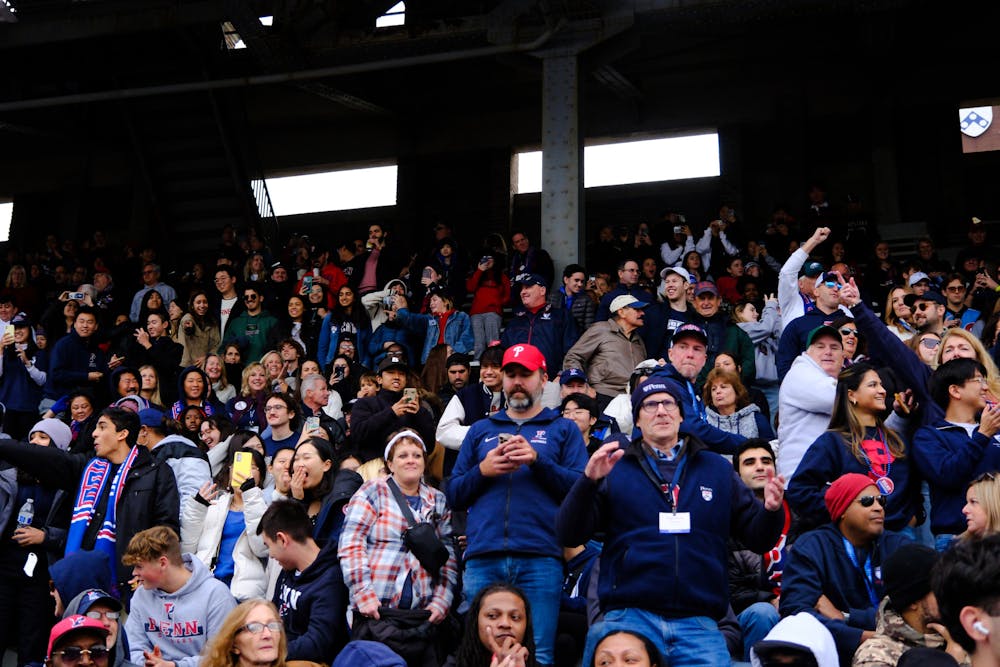
The Dunning Coaches' Center could’ve been mistaken for a locker room Friday night, or perhaps a time machine — one that took the 20 or so members of Penn football's Class of 1970 that filled the building back to their days in Red and Blue.
The tradition of the reunion was started 50 years ago when John Tremba went through Alumni Relations at Penn to look up the addresses of all of his former teammates and wrote out letters to everybody he could locate. After Tremba took this first initiative, his teammate George Joseph, captain of the 1969 squad, embraced his idea and now spearheads the effort every year.
The energy in the room was boisterous, with alumni catching up, reflecting on their time at Penn, and making fun of each other in equal parts. The attendees also avidly listened to coach Ray Priore detail the ups and downs of this season of Penn football (6-4, 3-4 Ivy).
Joseph credits his teammates for keeping him at Penn when he felt like a fish out of water his freshman year and almost left. His favorite memory with the team was when the Quakers beat Princeton after eight straight years of losing the rivalry game.
“Newsweek came out with an article about the worst teams in the country, and we were number one in the east,” he said. “Of course, we had to prove them wrong. We had good players; they just ignored us until we started to play better.”
Matt Matesic, 1969 College graduate, told an anecdote about receiving a call from a student working at the Penn financial department one Saturday a few years ago about renewing his yearly donation. After fielding her query, he asked her what she was doing that afternoon and was shocked when she didn’t even know there was a football game.
“The attendance at football games back when we were there would average 20,000 a game over the years,” he said. “Now, they're thrilled to get maybe 10,000 as their biggest crowd. That's somewhat of a disappointment. As a former athlete, the athletic department is really kind of the front door of the university, and the front door of the University is not very well kept. That's not a disparagement of the teams, but a disparagement of the acceptance of athletics on the part of the University.”
Much of their discussion was focused on Bob Odell, who served as Penn's head football coach at the time. David Barudin, 1969 Wharton graduate, reflected on Odell’s leadership and long-lasting impact on his players, especially as 1970 was his last year at the helm of the Red and Blue program.
“If you were a ham and eggs lineman, like my pal Matt, or if you were bringing home the bacon, like [David] Pottruck and these guys here who are amazing, Bob Odell gave us all an opportunity to play,” he said. “And even more than that, he gave us an education. We owe a lot to this man because he gave us all the opportunity to play, and that was the most important lesson in my life. Take advantage of your opportunities because you don't know when they're going to come back or if they'll ever come back around.”
He then read a short excerpt from his book, People Around the Corner and Other Strangers, that consisted of snapshots of scenes of Odell’s coaching and words.
“Penn continues to play a big role in our relationships personally with each other, and it also had a tremendous positive business impact,” Brian Regan, 1970 Wharton graduate, said. “ If you check, you'll find pretty successful business careers after Penn for all of us. To future student athletes, I'd say, obviously focus on being well prepared for your athletic career, but don't miss out on the opportunity to experience the rest of the campus and the rest of the students.”
Coach Priore’s main message about the program that all attendees seemed to agree with revolved around the idea that “football is the game of life” in that it cultivates resilience in athletes.
“As we know, the ball bounces,” Priore said. “Not like a basketball, up and down, but it keeps going in different directions. And is that not life?”
The alumni's contributions to the program have allowed the current athletes to have more resources than the alumni did, including three trainers, nutritionists, a sports psychologist, as well as other coaches in mental health. To Priore, an athlete's four years at Penn is an investment for their next 40.
“In today's world, trust me, my phone is right next to my bed and the ringer is on,” he said. “I can't tell you how many times I've gotten calls from our team, and it’s like you have 110 sons. You're not going to not pick up the phone when your son calls. You're constantly dealing with the mental part of things today, so it’s important. And, one day, they'll be just like you: 30 years out, still coming together, still telling those war stories that only get better with time.”
The Daily Pennsylvanian is an independent, student-run newspaper. Please consider making a donation to support the coverage that shapes the University. Your generosity ensures a future of strong journalism at Penn.
Donate







